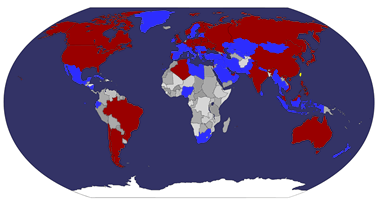EUROPA2009-L'Année internationale d'Astronomie

 EUROPE 2009. The International Year of Astronomy
EUROPE 2009. The International Year of Astronomy It is fairly common to regard astronomy as a pre-science, since the contemplations of the nature and behaviour of celestial bodies gave rise to some of the oldest theories on the structure of our world. In this cosmologic shape, astronomy was the father of philosophy (in particular the Greek one), which, in turn, allowed more specific branches of knowledge to develop.
The year 2009 was proclaimed the International Year of Astronomy by the United Nations, an idea that came from the International Astronomy Union (IAU) which this way wanted to commemorate certain important anniversaries. To begin with, it was 400 years ago that Galileo first used a telescope to gaze at the sky. The invention was a breakthrough and the discoveries it allowed are now the foundations of astronomy. Also in 2009, 40 years will have passed since the first man set foot on the Moon, and 90 years since the IAU was established.
"Discover your Universe", the motto of the International Year of Astronomy, makes us realise that a passion for astronomy is not restricted to scientists, but is shared by many ordinary people who watch the sky for pleasure. The infinite Universe is now within reach of any curious eye, and its mysteries stand ready to by explored using only a telescope and a computer. For the convenience of the hobbyists, this year's celebrations will include various committees for the organisation of educational schemes, shows, exhibitions and the like.
Astronomy in Poland
It's probably not common knowledge that the star of Nicolas Copernicus was not the first one to shine in the history of Polish astronomy. In 15th century the Jagiellonian University of Krakow, despite its relatively short tradition, earned itself the title of the best centre of studies in astronomy throughout Europe owing to the research of such scholars as Marcin Bylica and Wojciech z Brudzewa. Even though the academic level of the university deteriorated in the years to come, it became known all over Europe again thanks to the achievements of two researchers born in the city of Gdańsk - Jan Heweliusz and Stanisław Lubienicki, especially with the results of their observations of the Moon and the comets. Although the loss of independence marked a significant break in the development of sciences in Poland, the community of astronomers revived shortly after World War I ended with a new tool - the outstandingly effective and widely used theory of the cracovians, developed by another Polish scholar, Tadeusz Banachiewicz. More recently, that is in the second half of 20th century, the work of Bohdan Paczyński, who discovered the gamma radiation and worked out its theory, gained worldwide renown. That was only matched by the recent discovery made by Aleksander Wolszczan, a Polish astronomer who spotted the first planet outside our Solar System, revolving around a dying neutron star.

































 taiwan
taiwan  cover or postcard
cover or postcard  FDC
FDC 






























































































No comments:
Post a Comment